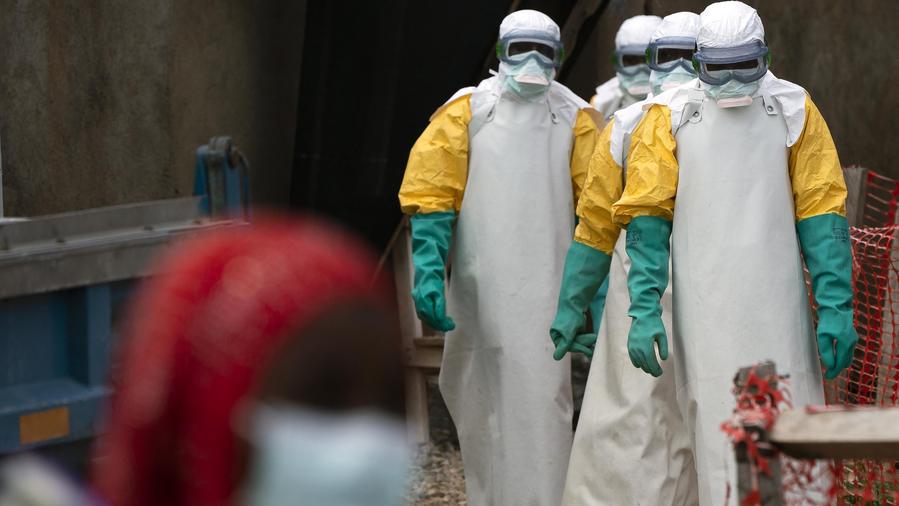 In this July 16, 2019 photo, health workers dressed in protective gear begin their shift at an Ebola treatment center in Beni, Congo DRC. (JEROME DELAY / AP)
In this July 16, 2019 photo, health workers dressed in protective gear begin their shift at an Ebola treatment center in Beni, Congo DRC. (JEROME DELAY / AP)
KINSHASA -- The health ministry of the Democratic Republic of the Congo (DRC) on Monday declared an end of the latest Ebola outbreak that erupted less than three months ago in Mbandaka, the capital of the northwestern Equateur province.
It was the third outbreak in the province since 2018 and the country's 14th overall.
With greater experience in Ebola control, DRC national emergency teams, with the support from World Health Organization (WHO) and partners, mounted a swift response soon after the outbreak was declared on April 23, rolling out key countermeasures including testing, contact tracing, infection prevention and control, treatment and community engagement.
The latest outbreak in Equateur province saw a total of 2,104 people vaccinated, including 302 contacts and 1,307 frontline workers
Vaccination, a crucial protective measure, was launched just four days after the outbreak was declared.
There were four confirmed cases and one probable case, all of whom died, in the latest outbreak.
In the previous outbreak, in Equateur province in June-November 2020, there were 130 confirmed cases and 55 deaths.
ALSO READ: DR Congo declares new Ebola outbreak
"Thanks to the robust response by the national authorities, this outbreak has been brought to an end swiftly with limited transmission of the virus," said Matshidiso Moeti, WHO regional director for Africa. "Crucial lessons have been learned from past outbreaks and they have been applied to devise and deploy an ever more effective Ebola response."
The just-ended outbreak saw a total of 2,104 people vaccinated, including 302 contacts and 1,307 frontline workers.
To facilitate the vaccination rollout, an ultra-cold chain freezer was installed in Mbandaka, allowing for vaccine doses to be safely stored locally and delivered effectively.
The DRC has now recorded 14 Ebola outbreaks since 1976, six of which have occurred since 2018.
"Africa is seeing an increase in Ebola and other infectious diseases that jump from animals to humans impacting large urban areas," said Moeti.
READ MORE: WHO: DRC sees 5 Ebola cases, all dead, amid latest outbreak
"We need to be ever more vigilant to ensure we catch cases quickly. This outbreak response shows that by bolstering preparedness, disease surveillance, and swift detection, we can stay a step ahead," she said.
Although the outbreak in Mbandaka has been declared over, health authorities will maintain surveillance and stand ready to respond quickly to any flare-ups. It is not unusual for sporadic cases to occur following an outbreak, according to a statement by the WHO regional office for Africa.
The disease, which affects humans and other primates, is severe and often fatal. Case fatality rates have varied from 25 percent to 90 percent in past outbreaks.
However, with the currently available effective treatment, patients have a significantly higher chance of survival if they are treated early and given supportive care.



